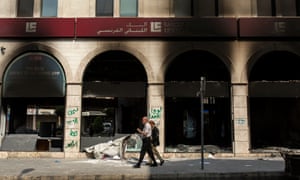
by theguardian.com — Martin Chulov — In the heart of the city that used to drive Lebanon’s economy, workers were busy with a rare jolt of enterprise, bolting steel plates to the ruins of its scorched banks. By dusk on Thursday, all of Tripoli’s ransacked branches were encased in armour, shielding piles of smouldering ash and rubble, but coming far too late to protect what had been inside. Over two earlier, violent nights, rioters had looted what they could. Six months after a revolution demanding action from a corrupt ruling class, and with a global pandemic now thrown in, its people are returning to the streets in rage at an enfeebled state that has largely left them to fend for themselves as the middle class sinks into poverty. Tripoli, a hub of a nationwide peaceful uprising last October that electrified the country, is now at the centre of something more raw and desperate – an increasing struggle to survive. The extent of the economic predicament has been laid bare in unusually transparent financial statements that have cast new light on Lebanon’s political structures and left many pondering the viability of a state that has withstood decades of war, occupation and chaos, but now appears adrift.
“We have been executing something like this for 20 years, but not as bad as what we’re living,” said Fida Jundi Hajjeh, the manager of a Tripoli-based NGO, Sanabel Nour, which provides food and other aid to orphans and the impoverished. “The middle class has been demolished. In Tripoli, we’re all from the low socio-economic classes these days.” “As much as we can give is not enough,” she said as small crowds waited silently outside her office for food coupons. “The needs are so great that we sometimes feel we are not doing anything. There are so many employees who have stopped working.” Tripoli during daylight hours in Ramadan is usually subdued, but with the coronavirus closing shops and cafes and most arms of government shut down, its streets are sullen and still. That changes as night draws near, bringing with it the bustle of a normal day. There is no social distancin, and very few face masks to shield people from the virus. “You think we care about that when people can’t feed themselves?” asked Linda Borghol, as she stirred a large vat in a makeshift food kitchen. “Nobody has anything in Tripoli. Nobody can send money. Even if you can send, it’s not easy to collect it. People are literally starving.”



